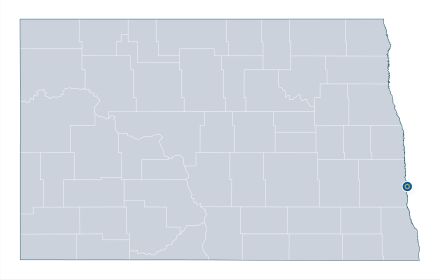The NSF North Dakota Advanced Agriculture Technology Engine (North Dakota), led by North Dakota State University, aims to create resilient and secure food systems in North Dakota by combining advanced genomics, climate modeling, nanoscale sensors and computer networks to monitor and improve the growth of crops via strong networks of stakeholders across the state — including bringing tribal, rural and farming communities intentionally and meaningfully into the process of co-creating a blueprint for the future of agriculture and workforce development.
Addressing a critical U.S. need: Nearly 90% of North Dakota is farm and ranchlands. Agriculture is the largest segment of the state's economy and is responsible for almost one-fourth of the state's employment. The NSF North Dakota Advanced Agriculture Technology (FARMS) Engine will lead the transition to the next frontier of agricultural technology advances by bringing together a powerful ecosystem of partners with representation from the world's large agricultural companies, technology companies, farmers, universities, regional and statewide economic and workforce development organizations, tribal organizations and innovation testbeds. This NSF Engine's focus on combining advanced crop data, genetic data, climate modeling and sensor technologies will surpass the current state of practice and capabilities, changing approaches to the important challenge of sustainably feeding a nation and the world. Its intentional focus on public crops, historically underinvested but critically vital food sources, will catalyze technological advances for climate-resilient crops like peas, edible beans, barley, canola, flax, oats and durum wheat.
Year 1 impacts:
- Accelerating innovation: Through its partnership with Grand Farm, the NSF FARMS Engine has created a test bed for precision agriculture technology, which now includes 16 deployed devices and more than 40 individual sensors with the potential to provide critical information about crop conditions — allowing farmers to make real-time, cost-saving resource management decisions.
- Building partnerships: One year in, the NSF FARMS Engine has established a cross-cultural coalition of partners that is incorporating indigenous knowledge into innovative solutions for agricultural challenges while advancing tribal nation-to-nation ethical research collaborations. The NSF FARMS Engine and Wozu announced a groundbreaking partnership that will empower them together to advance regenerative agriculture, AgTech innovation, and food sovereignty initiatives that strengthen local economies and enhance food security. In December 2024, the NSF FARMS Engine announced a new partnership with AgLaunch to ensure local growers negotiate an equity stake in the emerging agricultural technologies corporations test on their land.
- Growing the local economy: Grand Farm, a not-for-profit core partner of the NSF FARMS Engine, has grown from four to nearly 40 full-time employees since the NSF Regional Innovation Engines program launched. Recently expanding into the Southeast, their cross-sector network of growers, corporations, startups, educators, researchers, government officials and investors are collaborating on autonomous and advanced agriculture technology innovations, scaling what they have been learning in the Midwest to tackle agricultural challenges across the country.
Additional information
Lead organization: North Dakota State University.
Region of service: North Dakota (entire state).
NSF award: NSF-2315315
| Key technology areas |
|---|
| Biotechnology, advanced computing and semiconductors, advanced materials, advanced communications, artificial intelligence, data and cybersecurity, disaster prevention and mitigation, robotics and advanced manufacturing. |



